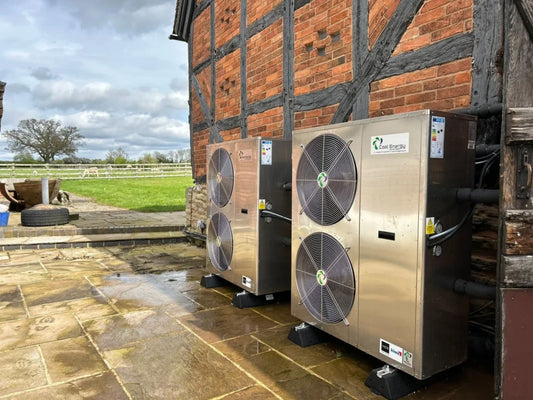
Air Source Heat Pumps: Paving the Way to a Sustainable Future
As we strive towards a greener and more sustainable future, it is crucial to explore innovative technologies that can mitigate climate change and reduce our reliance on fossil fuels. One such technology that holds tremendous potential is the air source heat pump (ASHP). In this blog post, we will delve into the reasons why air source heat pumps are emerging as the future of sustainable heating and cooling solutions.
- Energy Efficiency
One of the key advantages of air source heat pumps is their remarkable energy efficiency. Unlike conventional heating systems, which burn fossil fuels to generate heat, ASHPs utilize a small amount of electricity to extract heat from the ambient air. By leveraging the principles of thermodynamics, ASHPs can produce up to four units of heat energy for every unit of electricity consumed, resulting in an energy efficiency ratio (EER) of over 300%. This remarkable efficiency not only reduces energy consumption but also lowers utility bills for homeowners and businesses alike.
- Renewable Energy Source
Air source heat pumps tap into an infinite and readily available energy source: the air around us. The process involves absorbing heat from the outside air and transferring it indoors to heat buildings or water. Since air is a renewable resource, ASHPs offer a sustainable heating solution that reduces dependence on non-renewable energy sources. By leveraging the power of the environment, these systems align with the goals of reducing greenhouse gas emissions and combating climate change.
- Versatility and Year-Round Comfort
Air source heat pumps provide both heating and cooling capabilities, making them a versatile solution for year-round comfort. During colder months, ASHPs extract heat from the outdoor air, even in sub-zero temperatures, and transfer it indoors. Conversely, during warmer months, the system can be reversed to cool the indoor space by extracting heat from inside and dissipating it outdoors. This dual functionality eliminates the need for separate heating and cooling systems, resulting in cost savings and increased convenience for homeowners.
- Reduced Carbon Footprint
Transitioning to air source heat pumps significantly contributes to reducing carbon emissions. As ASHPs rely on electricity rather than burning fossil fuels, they produce lower carbon dioxide (CO2) emissions, helping combat global warming and improve air quality. By investing in renewable energy sources to power ASHPs, such as solar or wind, the carbon footprint can be further reduced, ensuring a greener and cleaner future for generations to come.
- Financial Incentives and Cost Savings
Governments around the world recognize the importance of promoting sustainable technologies and often offer financial incentives for adopting air source heat pumps. These incentives can include grants, tax credits, or subsidies, making the initial investment more affordable for homeowners and businesses. Furthermore, ASHPs help reduce long-term energy expenses due to their high energy efficiency. The savings on utility bills can offset the initial installation costs, resulting in significant cost savings over the lifespan of the system.
Conclusion
Air source heat pumps have emerged as a promising technology that addresses the urgent need for sustainable heating and cooling solutions. Their exceptional energy efficiency, reliance on renewable energy, year-round comfort, reduced carbon footprint, and financial incentives make them an attractive option for homeowners and businesses alike. As we strive to combat climate change and create a greener future, embracing air source heat pumps is a step in the right direction. By adopting this innovative technology, we can pave the way for a more sustainable and environmentally friendly society.
For more information, don't hesitate to contact us today.
Cool Energy | sales@coolenergyshop.com | www.coolenergyshop.com







